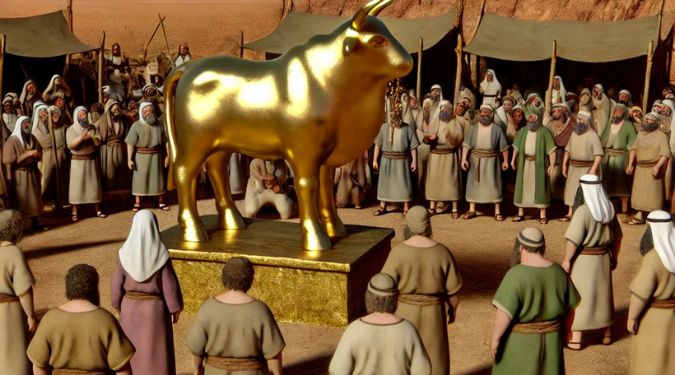This comment recently appeared on our Catholic Study Group Facebook page:

Here’s the short answer: Yes, God punished David by striking his baby with an illness that led to his death.
There are many things to note, however. First, the verse you quoted from the Book of Deuteronomy is a law that God imposed on the Israelites, not upon Himself. Secondly, David’s punishment included the loss of three other sons, as we shall see below. Nevertheless, God was punishing David, not the baby.
“Now wait,” you might say, “the baby died!”
Yes, and all of us die, and most of us die by an illness, even if it is brought on by old age.
“But the baby only lived seven days!” you might respond.
Yes, but here is what St. Thomas Aquinas said about that:
All men alike, both guilty and innocent, die the death of nature: which death of nature is inflicted by the power of God on account of original sin, according to 1 Samuel 2:6: “The Lord killeth and maketh alive.” Consequently, by the command of God, death can be inflicted on any man, guilty or innocent, without any injustice whatever.
Summa Theologiae, First Part of the Second Part, Question 94, Article 5, Reply to Objection 2
This idea of divine justice expressed by St. Thomas can make us feel very uncomfortable for at least two reasons. First, many of us have lost any belief in an immortal human soul, so we simply don’t believe that God can give eternal happiness to an innocent child. Secondly, while the secularists hate to admit it, our Western culture has been influenced by Jesus and his Gospel, especially the Sermon on the Mount and whether they like it or not, our concept of the dignity of human life can be credited to our society’s original Christian experience, notwithstanding the scandal of abortion or the tens of millions of civilians killed in the wars of the last century.
While that’s the summary of my response to your question, we can glean a lot more meaning from this Bible story. Let us first remind ourselves about the underlying story as it is told in 2 Samuel 11-12:
King David was already married to seven wives (Michal, Abigail, Ahinoam, Makkah, Haggith, Abital, and Eglah), but one day, he spied a beautiful woman bathing outside. He lusted after the woman, Bathsheba, but she was married to one of his army commanders, Uriah the Hittite. David got Batshsheba pregnant, and since Uriah and the King’s army was currently engaged with the Ammonites, David had Uriah come back to Jerusalem to sleep with Bathsheba so that it would seem that Uriah was the baby’s father. The loyal Uriah did come back, but he refused to sleep with his wife, so David had Uriah moved to the front lines so that he would be killed. Uriah was killed and David took Batshsheba as his wife. The prophet Nathan then confronts David with a powerful parable about a rich man, and a poor man with a lamb. David immediately recognizes his sin and repents.
Nathan assures David of God’s forgiveness, but then prophesies three events to David:
- “The sword shall never depart from your house” (12:10)
- “I [God]I will raise up evil against you out of your own house; and I will take your wives before your eyes, and give them to your neighbor, and he shall lie with your wives in the sight of this sun.” (12:11)
- “the child that is born to you shall die.” (12:14)
All three events eventually came to pass. After seven days, the baby dies. His son Absalom took David’s concubines on the roof of David’s palace in full sight of the people of Jerusalem (16:21-22). Lastly, David eventually loses three other sons, Amnon, Absalom, and Adonijah, to the sword, which David himself unwittingly prophesies in 2 Samuel 12:6 (see also Exodus 22:1).
Why did God end the life of the baby?
What good did God accomplish by striking David’s baby with illness? Well, David’s hasty admission of guilt was not enough. David was certainly forgiven of his sin, but he had some reparation to do. Nothing he could do would bring back Uriah, but he could mitigate the scandal he caused and come to a deeper repentance.
So while his son was sick, he spent seven days doing what we Catholics call “penance”, a penance that amazingly reflected the actions that the innocent Uriah took before his death! He “lay all night upon the ground (12:16) as Uriah did (11:9). He refrained from eating (12:16-17,20) as Uriah did (11:11), and from washing and anointing himself and changing his clothes (implied by 12:20) as Uriah did (11:11) and from having sex (implied by 12:24 ) as Uriah did (11:11) (Jacobs 571-572).
Conclusion
So to summarize my answer to the original question: God certainly punished David through the loss of not just one son, but four. His baby was not being punished, but the babies death did afford David the opportunity to do some deep penance for his sin.
References
Jacobs, Jonathan. “The Death of David’s Son by Bathsheba (II Sam 12:13-25): A Narrative in Context.” Vetus Testamentum, vol. 63, no. 4, 2013, pp. 566–76. JSTOR, http://www.jstor.org/stable/43894068. Accessed 23 Oct. 2024.






